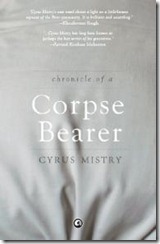I’m a sucker for books about Parsis. They’ve got some mad stories about them. Dysfunctional families, property disputes, affairs with first cousins, renting out apartments to suspicious tenants, unhappy marriages, colonial bungalows and what have you – murder, betrayal, divorce, illicit affairs – all ingredients for very gripping plots.

Written by Cyrus Mistry, the story for the book was concieved in 1991 at a time when the author was working on a Channel 4 documentary on corpse bearers in Bombay’s Parsi community. The film was never made, but one story he heard in the course of his research stayed with him. That story was about a middle-class Parsi dock worker in the pre-independence era who married the daughter of a khandhia. The person who narrated the story was the son to this improbable marriage.
The book essentially is an inspiration from that tale. Except, there isn’t a dock worker here. There’s Elchi (Phiroze Elchidana), son of a revered Parsi priest, narrating the story of his life – growing up in deeply religious Parsi household, being a non-achiever at school, falling in love with Seppy (Sepideh), the daughter of a khandhia, giving up his family to marry her, losing her soon after their daughter is born, and eventually his complete dignity amongst the Parsi community.
Being a group of a humiliated outcasts who have no rights, unreasonable working hours and very little money, the book also places an equally arresting story of a revolt by Elchi and his co-workers against the Parsi Panchayat demanding more humane treatment. This narrative runs parallel to events unfolding in the run up to India’s independence. The metaphor is well-placed, and Mistry’s storytelling blends a well-measured dose of black humour, irony and tragedy.
The second half of the book weaves in an even more amusing and heartbreaking incident concerning the funeral of a cancer patient Joseph, born to a Parsi father and a Christian mother, who upon realizing that his end is near, seeks release through a Zoroastrian funeral. The ensuing turbulence that this creates amongst the Parsi community, the Panchayat, press and the khandhias is the highlight of the book, and it’s eventual outcome finds neoralistic resonance even in today’s times.
Mistry shows a very mature and empathetic approach in telling the story, developing conflict, a sense of longing and loss, and brings a fair closure to each relationship in Phiroze’s life. The characters stay with the reader beyond the pages of the book and personally, it created a sense of urge in me to go visit Doongerwadi and live the story once more.
Chronicle of a Corpse Bearer is an important book. Not only does it mourn the rift created amongst individuals thanks to society’s desire to cling on to tradition, it also tells an unsettling story of those on the fringes of an alarmingly shrinking community.
–
Chronicle of a Corpse Bearer, published by Aleph Book Company, is available on uRead.com at 31% discount for Rs 342 / $6.16. Click here to buy / gift a copy. Free shipping, cash on delivery in India. Low cost shipping fees worldwide.
You may want to read Cyrus Mistry’s previous work, The Radiance of the Ashes. Available on uRead.com for Rs 220. Click here to buy.







